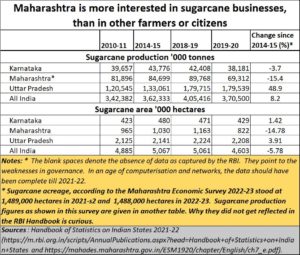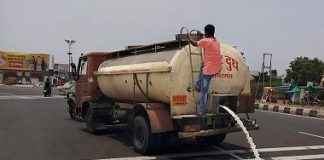Sugarcane will drive Maharashtra to the ground
RN Bhaskar
This article is the second part of a two part analysis of Maharashtra and Sugarcane. The first part can be found at https://asiaconverge.com/2023/03/poor-land-management-has-caused-many-farmers-to-commit-suicide/
If there is one crop where Maharashtra has done quite well for itself, it is in the growing of sugarcane.
Production of sugarcane went up 3.7 times since 1990-91. It increased from 38 million tonnes in 1990-91 (https://asiaconverge.com/2019/03/maharashtra-agri-woes-will-continue/) to 139 million tonnes in 2020-21 (https://mahades.maharashtra.gov.in/ESM1920/chapter/English/ch1_e.pdf).
 But to increase this production, the state had to allow greater acreage for this crop. Sugarcane acreage went up 2.5 times since 1990-91. It soared from 444,000 hectares in 1990 (https://www.asiaconverge.com/wp-content/uploads/2019/03/2019-03-07_Maharashtra-agri-woes.jpg) to 1.t million hectares in 2022-23 https://mahades.maharashtra.gov.in/ESM1920/chapter/English/ch7_e.pdf) .
But to increase this production, the state had to allow greater acreage for this crop. Sugarcane acreage went up 2.5 times since 1990-91. It soared from 444,000 hectares in 1990 (https://www.asiaconverge.com/wp-content/uploads/2019/03/2019-03-07_Maharashtra-agri-woes.jpg) to 1.t million hectares in 2022-23 https://mahades.maharashtra.gov.in/ESM1920/chapter/English/ch7_e.pdf) .
Politicians love sugarcane
And don’t just blame the Nationalist Congress Party (NCP) for protecting sugarcane interests. Remember, it was the Congress, under YB Chavan, who decided that sugarcane would be focussed on in the state. It gave the sugar barons immense political and financial clout. When the NCP came to power, they too continued to promote the growing of sugarcane. And the BJP which talks about being nationalistic and committed to farmer interests, did likewise. All the three political parties have substantial interests in this industry.
In fact, as recently as in March 2023, the state government agreed to a further protection of Rs.100 crore to the state’s sugarcane lobby (https://indianexpress.com/article/india/maharashtra-extends-bank-guarantees-to-co-op-sugar-mills-6635816/). As the news report put it, “ Ahead of the 2020-21 sugarcane crushing season, the way Maharashtra’s political forces impact its sugar sector is once again evident in the list of cooperative sugar mills that have received state government guarantees to raise funds from banks for their operations. While the government has stood guarantee for more mills managed by BJP leaders, the amount sanctioned to NCP-led mills is much higher.”
Sugarcane has become the soft underbelly of the state. It feeds its politics (more on this later). It looks after an immensely powerful section of farmers, and it also destroys the lives of countless millions of farmers. It is the sugarcane lobby in Maharashtra which has been primarily responsible for ensuring that less than 15% of the land that the state has been brought under irrigation. This is lower than the national average of 31%.
Thus farmers in other parts of Maharashtra don’t get access to water – sugarcane is water intensive. That could have been the main factor in causing at least 2,942 farmers to commit suicide in 2022 alone (https://asiaconverge.com/2023/03/poor-land-management-has-caused-many-farmers-to-commit-suicide/).
In some ways, the sugarcane industry in Maharashtra and Karnataka, two of the three major sugarcane producing states, are similar. Both states have sugarcane grown by cooperatives. Politicians, expectedly, want to win farmer votes and hence promise them a higher price for sugarcane. That is something that sugar mills invariably claim they cannot bear. So, the state gives a grant to the cooperatives to help them tide over their cash shortfall.
In Uttar Pradesh, the state government does not promote cooperatives. On the contrary, this state has been most exploitative of farmers, when compared to practices across the country (https://asiaconverge.com/2021/08/poverty-in-uttar-pradesh-and-bihar-is-not-accidental/). So, when politicians declare a higher purchase price for sugarcane, the sugar mills have to bear the brunt. To that extent, the sugarcane mills in Uttar Pradesh have remained more vulnerable to state government pressures than the sugar mills in Maharashtra and Karnataka.
But Maharashtra remains the worst off, because unlike Karnataka and Uttar Pradesh that have no shortage of water, Maharashtra is water scarce. As a result, any support for sugarcane is at the cost of other farmers. That also explains the wobbly nature of policy decisions when it comes to water.
When Joshimath began sinking (https://www.newindianexpress.com/nation/2023/jan/27/joshimath-sinking-scientists-claim-30-percent-of-ancient-town-is-hollow-2541912.html), the state government of Uttarakhand was quick to announce a ban on groundwater extraction across the state. Not to be left behind, the Brihanmumbai Municipal Corporation (BMC) did likewise. It banned the extraction of groundwater.
But the state government did not do the same across the state. This is again because much of the groundwater extraction is done by sugarcane growers. All water policies, including irrigation related decisions, are focussed on protecting sugarcane growers.
In fact, even before the Joshimath episode which became national news, the central government was quite aware of this problem. In August 2022, the central government stated that it would try and restrain ground water extraction (https://www.pib.gov.in/Pressreleaseshare.aspx?PRID=1848469). However, it appears that this was just lip service, at least where Maharashtra’s sugarcane industry in concerned.
Worsening problem
The biggest attraction that the sugarcane industry has for politicians is its ability to produce alcohol. Molasses from the sugar-crushing units is used by distilleries to make alcohol – much of which goes for making potable liquor.
Typically, a litre of alcohol is enough for making six bottles of liquor, and the price goes up from a few tens of rupees to several hundreds of rupees. Much of the difference is by way of excise duties and government levies, in addition to huge profits that distillery owners are known to make. Quite a bit of the sale of liquor is done clandestinely, thus saving of government taxes, which in turn is shared with people close to politics across all party lines. Actually, many of the people at the helm of cooperatives in both Maharashtra and Karnataka are themselves active politicians.
That explains why all sugarcane cooperatives have their sugar-crushing operations under the cooperative structure, but their distilleries as private companies. In Uttar Pradesh as well, distilleries are not clubbed with the money that sugar-mills make or lose. No politicians would dare to disturb this structure. So while the authorities may level charges against state ministers in Delhi for excise irregularities relating to liquor vending, nobody talks about the elephant in the room – the distilleries themselves.
For Maharashtra, the problem is likely to get worse because of the government’s policy of allowing the blending of ethanol with fuel for vehicles. That is a good policy. It is good for the environment, but it is also good for the profits that the sugar industry and distilleries can make. That in turn will compel politicians to bring more land under sugarcane acreage, and hence more land under growing this crop. Expect farmer distress in Maharashtra to get worse in the coming decades. Unless solutions are found immediately.
Solution
The only solution would therefore lie in the central and state government to first freeze acreage under sugar cultivation, and then force it to reduce acreage and water consumption. Ground water extraction rules will have to be further tightened, especially for this industry.
At the same time, the government should allow, even encourage, water resourced states like Uttar Pradesh to up their production of sugar and ethanol.
Maharashtra may not like this, but there appears to be no other alternative. It would be foolish to close down this industry. It is too closely linked with pharmaceutical and other chemical industries which need industrial alcohol. The bagasse feeds cattle in these states.
But unless steps are taken quickly, Maharashtra could experience a type of desertification that has not been imagined. Even existing groundwater resources could turn saline – to the detriment of all farming and community wells (https://asiaconverge.com/2019/07/the-water-series/).
Clearly, all parties need to sit down together and work out future plans. But the rapid growth of sugarcane and related businesses in Maharashtra needs to stop immediately.






































COMMENTS